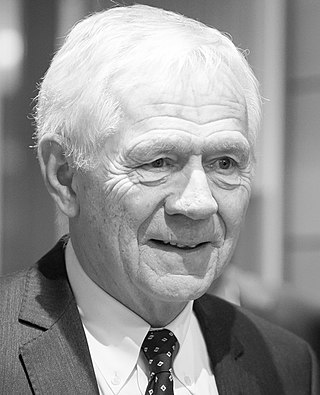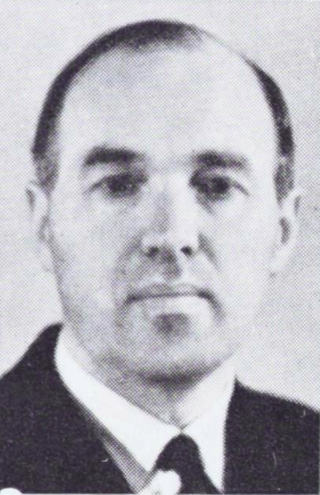Related Research Articles

Kjell Magne Bondevik is a Norwegian Lutheran minister and politician. As leader of the Christian Democratic Party, he served as the 33rd prime minister of Norway from 1997 to 2000, and from 2001 to 2005, making him, after Erna Solberg, Norway's second longest serving non-Labour Party prime minister since World War II. Currently, Bondevik is president of the Oslo Centre for Peace and Human Rights.

The Christian Democratic Party is a Christian-democratic political party in Norway founded in 1933. The party is an observer member of the European People's Party (EPP). It currently holds three seats in the Parliament, having won 3.8% of the vote in the 2021 parliamentary election. The current leader of the party is Dag Inge Ulstein.

The Socialist Left Party is a democratic socialist political party in Norway. Positioned on the left-wing of the political spectrum, it is opposed to European Union and the European Economic Area membership. SV supports a strong public sector, stronger social welfare programs, environmentalism, and republicanism. As of 2018, the party had 11,385 members; the number has steadily increased since a low point in 2015. The party leader is Kirsti Bergstø, who was elected on 18 March 2023

The Centre Party, formerly the Farmer's Party, is an agrarian political party in Norway.

Erna Solberg is a Norwegian politician and the current Leader of the Opposition. She served as the 35th prime minister of Norway from 2013 to 2021, and has been Leader of the Conservative Party since May 2004.

The Liberal Party is a social liberal political party in Norway. It was founded in 1884 and is the oldest political party in Norway. It is positioned in the centre on the political spectrum, and it is a liberal party which has over the time enacted reforms such as parliamentarism, freedom of religion, universal suffrage, and state schooling.

Parliamentary elections were held in Norway on 11 and 12 September 2005. The result was a victory for the opposition centre-left Red-Green Coalition, which received 48.0% of the votes and won 87 out of 169 seats, dominated by the Labour Party's 61 seats. The three-party centre-right government coalition won 44 seats and the right wing Progress Party won 38, becoming the largest opposition party. Voter turnout was 77.1%, an increase of 2 percentage points compared to the 2001 elections.

Victor Danielsen Norman was a Norwegian economist, politician for the Conservative Party and newspaper columnist. He was a professor of economics at the Norwegian School of Economics (NHH) and sst chairman of the Institute for Research in Economics and Business Administration.

Parliamentary elections were held in Norway on 13 and 14 September 1981. The Labour Party remained the largest party in the Storting, winning 66 of the 155 seats. The Conservative Party made the strongest gains and formed a government on its own. In 1983 a majority coalition government with the Christian People's Party and the Centre Party was established.
The red–green coalition was a centre-left coalition of parties in Norway, constituting the Labour Party (Ap), the Socialist Left Party (SV), and the Centre Party (Sp). Unlike many other Red-Green coalitions, the "green" here was the colour of a centrist eurosceptic Nordic agrarian party rather than an actual green political movement. It governed from 2005 until Labour Party leader Jens Stoltenberg resigned his cabinet on 16 October 2013 following the coalition's defeat in the 2013 elections.
Ansgar Gabrielsen is a Norwegian consultant and former politician for the Conservative Party.

Kjell Bondevik was a Norwegian politician for the Christian Democratic Party.
Guro Fjellanger was a Norwegian politician for the Liberal Party. She served as Minister of the Environment in the first cabinet Bondevik from 1997 to 2000. She was a private consultant and a board member of several government agencies and organisations, and a member of two government-appointed commissions.

Siv Jensen is a Norwegian politician who served as the leader of the Progress Party from 2006 to 2021. She also held the position as Minister of Finance from 2013 to 2020 in the Solberg Cabinet. She was also a member of the Norwegian parliament from Oslo from 1997 to 2021.

Parliamentary elections were held in Norway on 13 and 14 September 2009. Elections in Norway are held on a Monday in September, usually the second or third Monday, as determined by the king. Early voting was possible between 10 August and 11 September 2009, while some municipalities also held open voting on 13 September. Voters elected 169 members for the Storting, each for a four-year term. Voter turn-out in the 2009 general elections was 76.4%.
Per Arne Watle is a Norwegian businessperson and former politician for the Centre Party. He is best known as the CEO of Widerøe from 1997 to 2008.

The 2009 national conventionof the Socialist Left Party of Norway was held from March 19–22 at the Scandic Bergen City Hotell and Bergen People's House in the city of Bergen, Hordaland. 208 delegates attended the convention.

Åsmund Grøver Aukrust is a Norwegian politician for the Labour Party. He is member of Parliament from Akershus county, first elected at the Norwegian parliament election in 2013. He was the deputy leader of the Workers' Youth League (AUF) from 2010 to 2014. He was also deputy member of the Parliament of Norway for the term 2009–2013.

Møre og Romsdal is one of the 19 multi-member constituencies of the Storting, the national legislature of Norway. The constituency was established as Møre in 1921 following the introduction of proportional representation for elections to the Storting. It was renamed Møre og Romsdal from 1935. It is conterminous with the county of Møre og Romsdal. The constituency currently elects seven of the 169 members of the Storting using the open party-list proportional representation electoral system. At the 2021 parliamentary election it had 192,394 registered electors.

The Minister of Education is a councilor of state in the Ministry of Education and Research. The incumbent minister is Kari Nessa Nordtun of the Labour Party who has served since October 2023.
References
- ↑ Heidar, Knut (2005). "Norwegian Parties and the Party System". West European Politics. 28 (4). London: Frank Cass: 829. doi:10.1080/01402380500216757. ISSN 0140-2382.
- ↑ Narud, Hanne Marthe; Strøm, Kaare (2000). "Norway. A Fragile Coalition Order". In Wolfgang C. Müller, Kaare Strøm (ed.). Coalition Governments in Western Europe. Oxford: Oxford University Press. pp. 177–178. ISBN 0-19-829760-2 . Retrieved 4 October 2009.
- ↑ Narud and Strøm, 2007: p. 161
- ↑ Strand, Arne (10 March 2005). "Sp og Ap – ringen er sluttet". Dagsavisen (in Norwegian).
- ↑ "Åpen holdning i Stortinget". Dagens Næringsliv (in Norwegian). 15 October 1997.
- ↑ Wiedsvang, Kjetil (23 October 2001). "Sp etter Sentrum". Dagens Næringsliv (in Norwegian).
- ↑ Alstadheim, Kjetil B. (18 December 2001). "Kan si ja til EU og nei til euro". Dagens Næringsliv (in Norwegian).
- ↑ Tjernshaugen, Karen R. (13 April 2002). "Går av hvis EU-saken eksploderer". Dagsavisen (in Norwegian).
- ↑ Aabø, Stein (11 October 2001). "De passer sammen". Dagbladet (in Norwegian).
- ↑ Spence, Thomas (15 July 2005). "Politiske tryllekunster må til". Aftenposten (in Norwegian).
- ↑ Strand, Tron (27 September 2005). "Selvmordsparagraf i regjeringserklæringen". Bergens Tidende (in Norwegian).
- ↑ Aurdal, Martine (28 October 2005). "Nekter å føye seg". Ny Tid (in Norwegian).